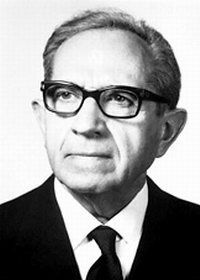<Back to Index>
- Biologist Albert Claude, 1899
- Painter Lavinia Fontana, 1552
- Member of British Parliament William Wilberforce, 1759
PAGE SPONSOR

Albert Claude (August 24, 1899 – May 22, 1983) was a Belgian biologist who shared the Nobel Prize in Physiology or Medicine in 1974 with Christian de Duve and George Emil Palade. He studied medicine at the University of Liege (Belgium). During the winter of 1928 - 29 he worked in Berlin, first at the Institut für Krebsforschung, and then at the Kaiser Wilhelm Institute for Biology, Dahlem. In the summer of 1929 he joined the Rockefeller Institute. While working at Rockefeller University in the 1930s and 1940s, he used the electron microscope to make images of cells which deepened the scientific understanding of cellular structure and function. He discovered the chloroplasts in the cell.
In 1930, Claude discovered the process of cell fractionation, which was groundbreaking in his time. The process consists of grinding up cells to break the membrane and release the cell's contents. Claude then filtered out the cell membranes and placed the remaining cell contents in a centrifuge to separate them according to mass. He divided the centrifuged contents into fractions, each of a specific mass, and discovered that particular fractions were responsible for particular cell functions.
In 1949, he became Director of the Institut Jules Bordet, Centre des Tumeurs de l'Université Libre de Bruxelles of the Université Libre de Bruxelles (ULB) in Brussels where he would stay until 1970.
In 1970, together with George Palade and Keith Porter he was awarded the Louisa Gross Horwitz Prize from Columbia University. For his discoveries concerning the structural and functional organization of cells, Claude received the 1974 Nobel Prize in Physiology or Medicine, which he shared with his student George Palade and Christian de Duve.